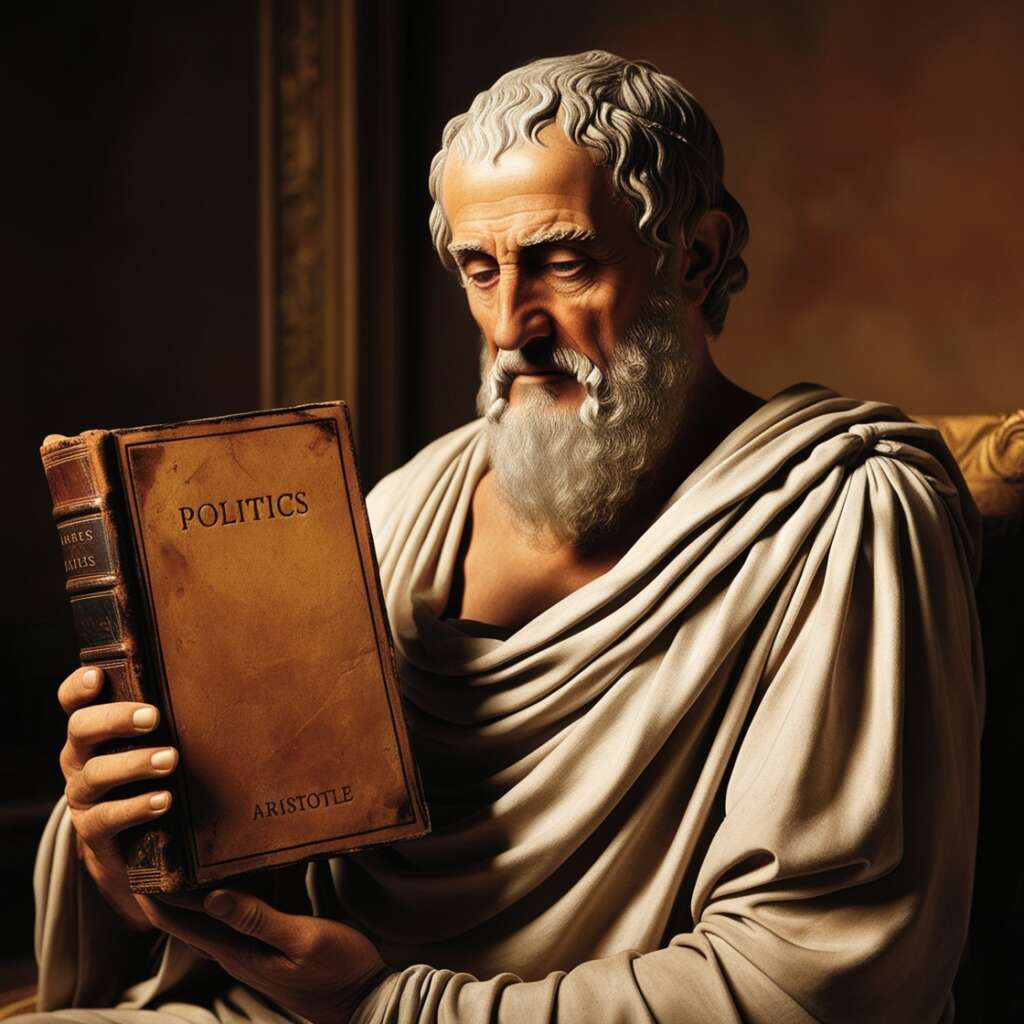Share This Article
Aristotle’s Politics stands as one of the most comprehensive explorations of governance, societal structure, and human virtue. Through its multifaceted arguments, it examines not just how states function but also how they ought to function, guided by the pursuit of the highest good. Let’s dive into the timeless insights that this classic work offers.
The State: A Community for the Highest Good
Aristotle begins with a profound observation: every state is a community, and all communities aim at some good. The state, however, seeks the highest good, making politics a supreme art. This premise sets the tone for his exploration of governance, citizenship, and societal roles.
In his view, understanding a state requires delving into its basic units—households. A household comprises relationships such as master and slave, husband and wife, and father and children, each governed by its distinct dynamics and roles.
Rethinking Slavery: By Law and Nature
One of the most debated aspects of Aristotle’s work is his discussion of slavery. He distinguishes between slaves “by law,” where captives of war are enslaved, and slaves “by nature,” whom he controversially describes as lacking the rational capacity for self-governance. However, Aristotle is not uncritical of slavery by law, acknowledging that victory in war does not inherently justify enslavement.
This duality reveals a deeper inquiry: Is mastery a science or an imposition contrary to nature? Aristotle’s nuanced approach reflects his willingness to question established norms.
Virtue and Rule: A Question of Balance
A recurring theme in Aristotle’s Politics is the relationship between virtue and governance. He asserts that different forms of rule demand different virtues. For instance, a man’s courage is displayed in leadership, while a woman’s is seen in obedience. Although dated in its gendered perspective, this observation underscores Aristotle’s belief in tailored education and roles for cultivating virtue across society.
He emphasizes that education must align with the constitution, as virtuous women and children are essential for a virtuous state. This forward-thinking view on education hints at its foundational role in shaping a stable and just society.
The Flaws of Unity and Communal Living
Critiquing Socrates’ vision of a communal society, Aristotle warns that excessive unity can destroy a state’s diversity and dynamism. The principle of compensation—where citizens take turns ruling and being ruled—ensures balance and stability.
Aristotle also critiques communal ownership, arguing that shared resources often receive less care than private possessions. Legislators, he suggests, should focus on education and laws rather than utopian ideals.
Governance: True Forms and Corrupt Counterparts
Aristotle categorizes governments into three “true” forms—royalty, aristocracy, and constitutional government—each aiming for the common good. Their corrupt counterparts—tyranny, oligarchy, and democracy—prioritize selfish interests.

He critiques the simplistic understanding of justice in oligarchies and democracies, noting that neither wealth nor freedom should dominate political rights. Instead, justice lies in the common interest, requiring a careful balance of power and equality.
The Middle Class: Pillar of Stability
Aristotle champions the middle class as the backbone of a stable state. Moderate wealth, he argues, fosters rational principles and guards against the extremes of crime and instability associated with poverty and excessive wealth.
In his ideal state, the middle class ensures that the constitution’s supporters outnumber its detractors, preserving its longevity. This pragmatic approach to governance resonates even today.
Education: The Foundation of Virtue
For Aristotle, education is not merely a means to practical skills but a path to cultivating virtue. He advocates for a public and uniform education system, ensuring that all citizens are trained in body and mind.
Interestingly, Aristotle delves into music as an educational tool, exploring its emotional and ethical effects. By refining taste and encouraging harmony, music becomes a metaphor for the balanced life Aristotle envisions for citizens.
The Perfect State: Balancing Idealism and Pragmatism
Aristotle’s perfect state is not an unattainable utopia but a practical ideal tailored to the capabilities and resources of most societies. He emphasizes balanced territorial size, defensibility, and resource accessibility. A state’s structure, he argues, must support good governance without overwhelming its citizens.
The role of law versus individual rule also takes center stage. While written laws offer consistency, Aristotle acknowledges that they lack the flexibility of human judgment. This tension reflects the broader challenge of aligning ideal governance with real-world complexities.
Conclusion: Aristotle’s Enduring Relevance
Aristotle’s Politics remains a masterclass in political philosophy, offering insights that transcend its historical context. From the importance of the middle class to the critique of excessive unity, his observations resonate with contemporary challenges. By emphasizing virtue, education, and balance, Aristotle presents a vision of governance that prioritizes the collective good while respecting individual roles and capabilities.
His work invites us to reflect on our political systems, urging us to strive not for perfection but for a practical and virtuous balance. In this pursuit, Aristotle’s wisdom continues to light the way.
